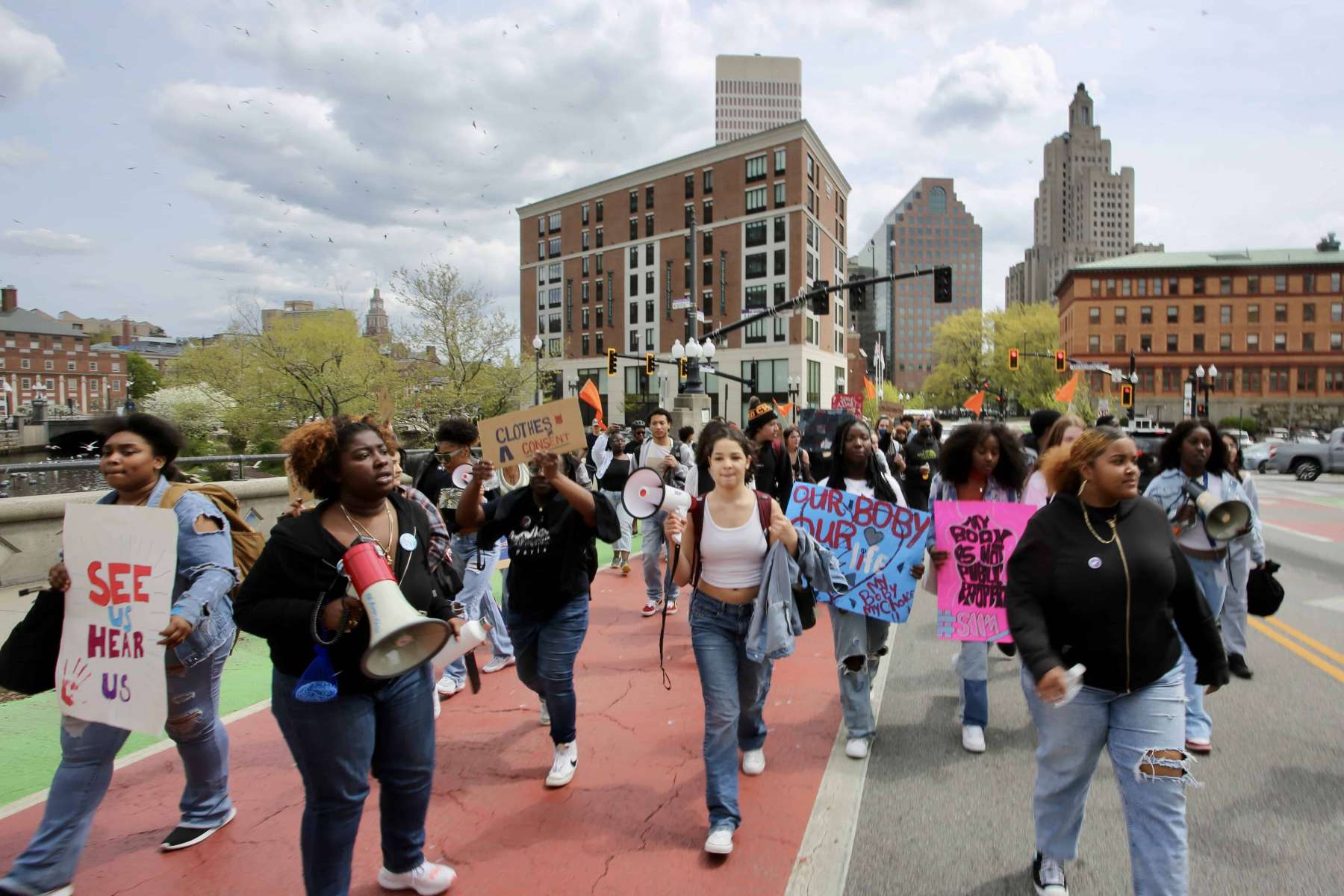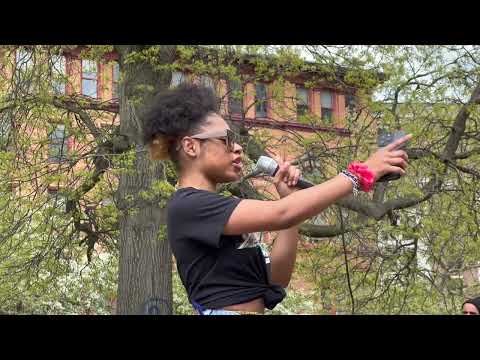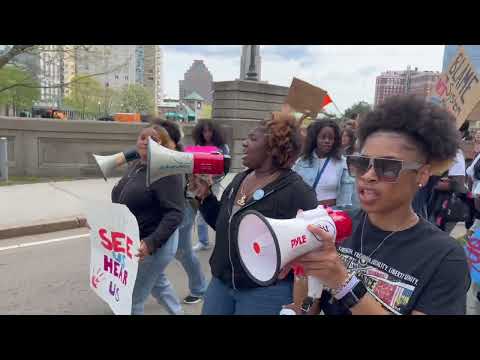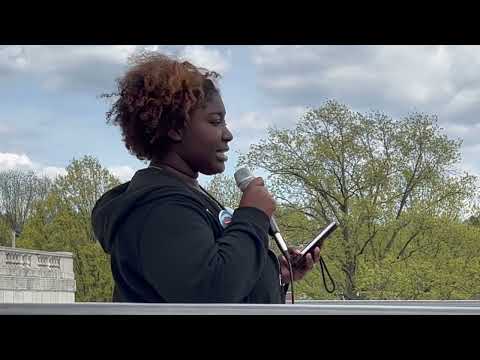Students march and rally against sexual assault and rape culture
Several high school students spoke from the State House steps to a supportive crowd about their experiences of rape and purity culture in speeches and poetry. It was at times heavy and heartbreaking, but also brave and beautiful.
April 29, 2023, 10:04 am
By Steve Ahlquist
Nearly 100 people, mostly high school students and their allies, gathered in Burnside Park on Friday, leaving school early to participate in a Denim Day march to show solidarity and support with survivors of sexual assault. Everyone who spoke at the event was a high school age youth, and their public testimonies were at times heavy and heartbreaking.
The Denim Day campaign began 24 years ago in response to an Italian Supreme Court ruling in which a rape conviction was overturned because the victim was wearing tight jeans and “she must have helped her rapist remove her jeans, thereby implying consent.” In response, “the women in the Italian Parliament came to work wearing jeans in solidarity with the victim.”
“Today survivors and their allies all over the world stand united in wearing denim as a statement of solidarity and support for survivors,” said High School student Mocorah Lewis to the crowd at Burnside Park. “Denim Day is not just about wearing jeans. It’s about standing up against rape culture and challenging the myths and misconceptions that perpetuate it.”
With the help of adult allies from Direct Action for Rights and Equality (DARE), Planned Parenthood, the Providence Student Union (PSU), ARISE, Sojourner House and the NAACP, the students marched to the south steps of the Rhode Island State House.
“Hey, Hey, Ho, Ho, Sexual violence has got to go!”
“Two four, six, eight, Stop the violence, stop the rape!”
“What does no mean? No! What does yes mean? Yes!”
Several high students spoke from the State House steps to a supportive crowd about their experiences of rape and purity culture in speeches and poetry. The brief excerpts below do not convey the power of these speeches and poems. They must be seen and heard to be fully appreciated.
“I know the pressure of living in a system that constantly works against my favor,” said Aaliyah. “A system that puts you in a box, or at least tries to get you to comply with unrealistic norms. A system that ignores the most precious parts of my identity and self expression, even down to the clothes that I wear.
“For so many of us ,our clothing choices are a reflection of our personality, style and mood. They can convey our interests, beliefs and culture. Clothes have the power to communicate our emotions or our attitudes for a particular event or situation. It’s a way in which we can connect with one another.”

“I’d like to address [my school] administration,” said Alyson, a senior at Paul Cuffee Upper School. “Which, to my knowledge, has swept harassment cases under the rug, and allowed it to occur in our classrooms and our community. That same administration threatened suspension upon students who wanted to come [to this event] today, as a scare tactic, despite that not being true. They also removed the flyers I put up and did not support this at all.
“They also, which I feel is relevant to all of our schools, consistently punish students for violations of a dress code that promotes rape culture – perpetuates racist, sexist, homophobic and transphobic ideals of what should be worn. And that’s just wrong. Don’t tell me what to wear.”
Isis read a piece titled, “I am a woman” while wearing a tee shirt that had the words, “Did I say yes?” painted on it.
“I am a woman. I am a woman that can easily form a bond over becoming overly vulnerable discussing a shared trauma. I am a woman that can look into the eyes of another Medusa. A woman that comes to hard terms to understand when another person tells you, ‘You didn’t deserve that,’ instead of telling you, ‘Why didn’t you just stop him.’
“I am a woman who at times is just a person and not a woman, who sometimes envies the concerns of a man, instead of a woman. I am a woman who is tired of pretending that it never happened. I am a woman who told you, ‘no,’ that begged even. I became weary of attempting to fix myself, of blaming myself, all because you wanted to be satisfied…”

“As a society, we must acknowledge that the system never failed us,” said Nabou. “It was set up against us. We must realize that the dress code was never set up to protect us, but to victim blame us. It is the undeniable truth that Black girls are disproportionately impacted by sexual violence. Black girls face a range of obstacles that makes us more vulnerable to abuse including poverty, lack of access to health care, education and lack of access to our own bodies.
“And the effects of this racist, systematic system, is what keeps us under. It is unacceptable that we are more likely to experience sexual violence and we must work to change this reality…”

“He called her a whore. School officials stood quiet, a crime of silence,” said Eugenie, reading her untitled poem. “He could have stood up for her. Instead, he erased the emails. Oh, how I pay, still pay, for the recklessness of boys. Little Bretts, little Jeffs, little knives to my breast…”
“In our world, the state of being a virgin is cherished and adored. In multiple religions and cultures, the state of being a virgin is the most sacred thing,” said Favour, reading from her brave and beautiful piece, “My Virginity.”
You should watch all the speeches and poems here:


















